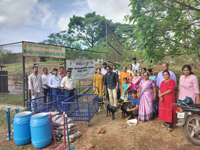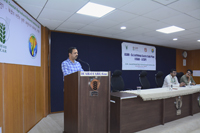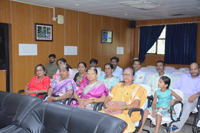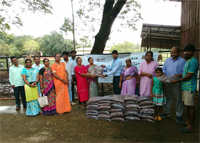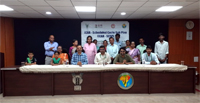
Exposure visit and distribution of inputs to farmers under SCSP
Exposure visit and distribution of inputs to farmers under SCSP
The ICAR–Central Coastal Agricultural Research Institute (ICAR-CCARI), Goa, organized a one-day exposure visit and input distribution programme for 15 farmers from the Deepasthambam Mahila Society—an association comprising 150 Scheduled Caste (SC) women farmers—from Usgao village, Ponda, Goa under SCSP on 2nd June 2025. The farmers were introduced to advanced technologies, infrastructure, livestock and fishery units, and integrated farming systems developed by the institute. The objective was to enhance their knowledge base, promote the adoption of modern and natural farming practices, and provide hands-on exposure to innovative agricultural methods. Dr. Parveen Kumar, Director of ICAR-CCARI, addressed the participants and reaffirmed the Government of India’s commitment to the inclusive development of Scheduled Caste communities. He emphasized the institute’s dedication to empowering marginalized farmers through capacity building, technology transfer, demonstrations, and input support. Dr. Shirish Narnaware, Senior Scientist and Section-in-Charge of Animal and Fishery Sciences, highlighted the pivotal role of livestock in coastal agriculture and elaborated on productivity-enhancing technologies developed by the institute. Dr. Susitha Rajkumar, Senior Scientist (Veterinary Pathology), stressed the importance of goat farming in the context of climate change and shared recommended practices. Dr. Gopal R. Mahajan, Senior Scientist (Soil Science), underlined the benefits of organic farming and the critical need for on-farm resource recycling to ensure clean, green, and sustainable agriculture in coastal regions. Dr. Sreekanth GB, Senior Scientist (Fisheries Resource Management), presented fisheries technologies and aquaculture practices developed by the institute and advocated for integrating fish into farming systems to boost productivity and income. As part of the event, essential agricultural inputs were distributed to the farmers, including goats, Phospho Urja (a phosphorus-rich organic manure), trolleys, coconut dehusking devices, and HDPE barrels. The field visits and distribution activities were efficiently coordinated by Shri Manish Patel, Technician from the Natural Resource Management Section. The farmers expressed their sincere gratitude to the institute for the scientific guidance, technical support, and input assistance provided. They also pledged their full cooperation in the institute’s ongoing and future research and development initiatives.
